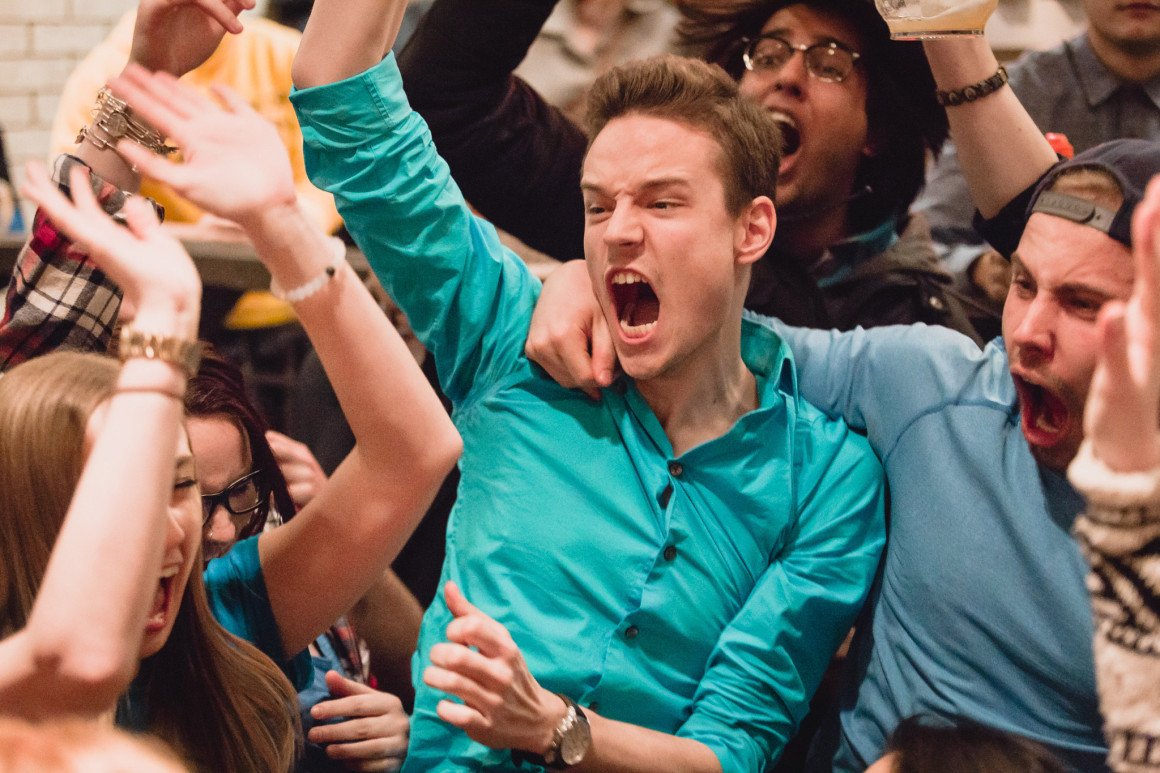
How to win a Students’ Union election
By Fabian Mayer, March 8 2016 —
With costumed candidates, goofy posters and empty promises, the Students’ Union elections can seem more like a junior high vote for class president than a real political campaign. But this is deceiving. Campaigns are often planned months in advance and include dozens of volunteers.
Jonah Ardiel ran in two campaigns, winning vice-president student life in 2014. This year he managed Patrick Ma’s successful bid for vice-president student life.
Ardiel said the campaign is divided into poster and ground campaigns. The poster campaign includes all printed materials, while the ground campaign involves talking to students in person and doing classroom visits.
“The candidate that works the hardest is likely the candidate that’s going to win,” Ardiel said. “I think the grunt work — face-to-face interactions, reaching as many students as you can — is the most important part.”
Ardiel said having an established base of volunteers is crucial to getting your candidate’s name and message to all corners of campus.
Mischa Nagtalon agrees. She was one of two campaign managers on Tristan Bray’s successful bid for vice-president external. Nagtalon said their campaign’s 20–30 volunteers were key to making Bray’s campaign as visible as possible.
“We wanted to make sure for the two weeks that we had blue and white everywhere and that there was nobody on campus who didn’t know who [Bray] was by the end of it,” Nagtalon said.
Bray also had a social media manager and graphic designer on his team. Nagtalon said they held a small seminar designed to teach volunteers about Bray’s platform points prior to the campaign.
“We got our volunteers comfortable with talking about [Bray’s] campaign,” Nagtalon said. “When people ask, you have to be able to tell them.”
The team also had social media content planned and ready to post as soon as the campaign started.
Vice-president student life candidate Graham Duff chose not to use a campaign manager. He said he was the most logistically minded of his friends, but Duff was impressed by the social media tactics being used by candidates like president-elect Stephan Guscott.
“I was following all the presidential pages but I looked on my Facebook and I had seven of [Guscott’s] stories in a row because he used a Facebook technique which brings his stories to the top,” Duff said.
If he runs again, Duff said he will likely use a campaign manager to make things more convenient.
Ardiel said another common
social media tactic is having volunteers send mass messages to their friends, asking them to vote for their chosen candidate. He said campaigns should make sure to do this on the first day of voting, when the majority of voting takes place.
Posters are another important part of the campaign. Ardiel said the amount of time volunteers put into making the banners may surprise some students. He claimed Ma’s banner in MacHall took 25–30 hours to create.
Getting coveted banners locations is another factor. Guscott and vice-president external candidate Martin Cruz waited nearly 50 hours to secure the spots leading to the train station. Ardiel remarked that candidates who get that spot usually do very well, though he isn’t sure if the location is solely responsible.
“It’s the work that you put into it,” Ardiel said. “But it is a heavy traffic spot, so it’s highly coveted and people know that now.”
Ardiel and Ma got to their spot in MacHall roughly 20 hours before posters were allowed to go up, but had to briefly vacate the area because of campus security.
“This year we got kicked out so we had to wait between the doorways and run back to our spot,” Ardiel said.
Classroom visits are another campaign staple. A new rule was implemented for this election that required candidates to obtain advanced permission from professors to speak in their class. To get around this, candidates printed out permission forms for professors to sign immediately before giving their pitches in a class.
However, the co-Chief Returning Officers decided that this did not count as advanced permission near the end of the election, sending campaigns scrambling to e-mail as many professors for permission as possible.
Ardiel said this back-and-forth on new rules and ways to get around them may have a detrimental effect on campaigning.
“Every year new rules are established based on what candidates did in the previous years,” Ardiel said. “It’s almost limiting the ability of candidates to reach students.”
